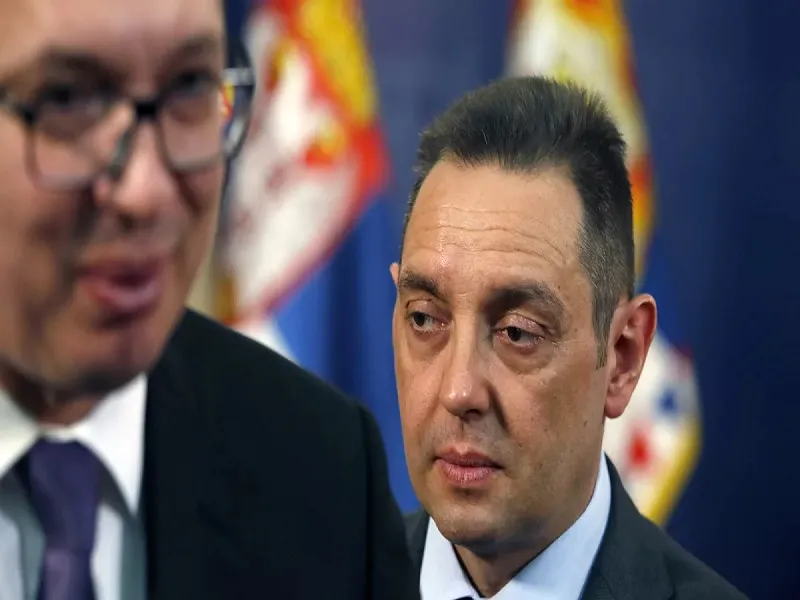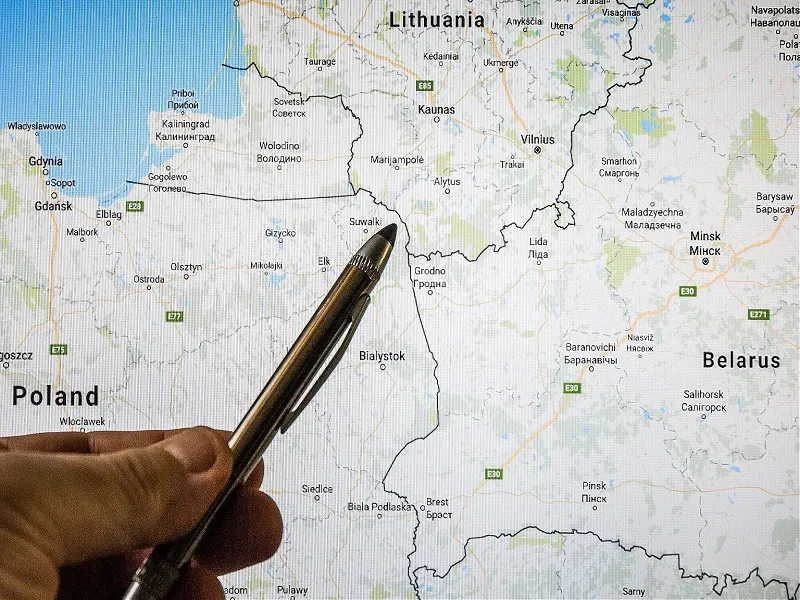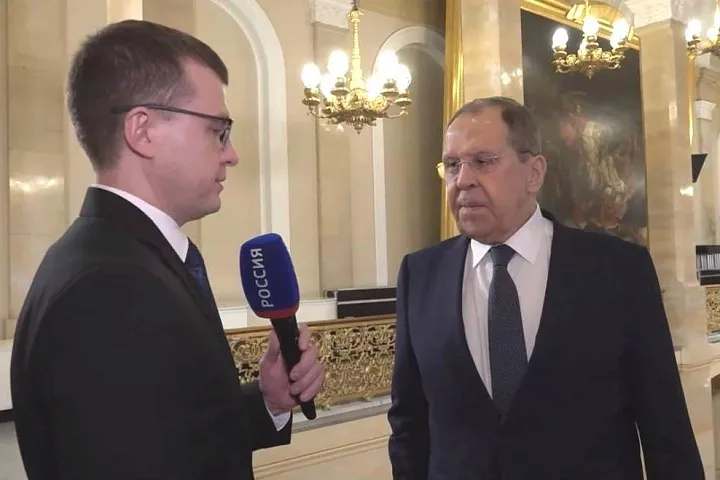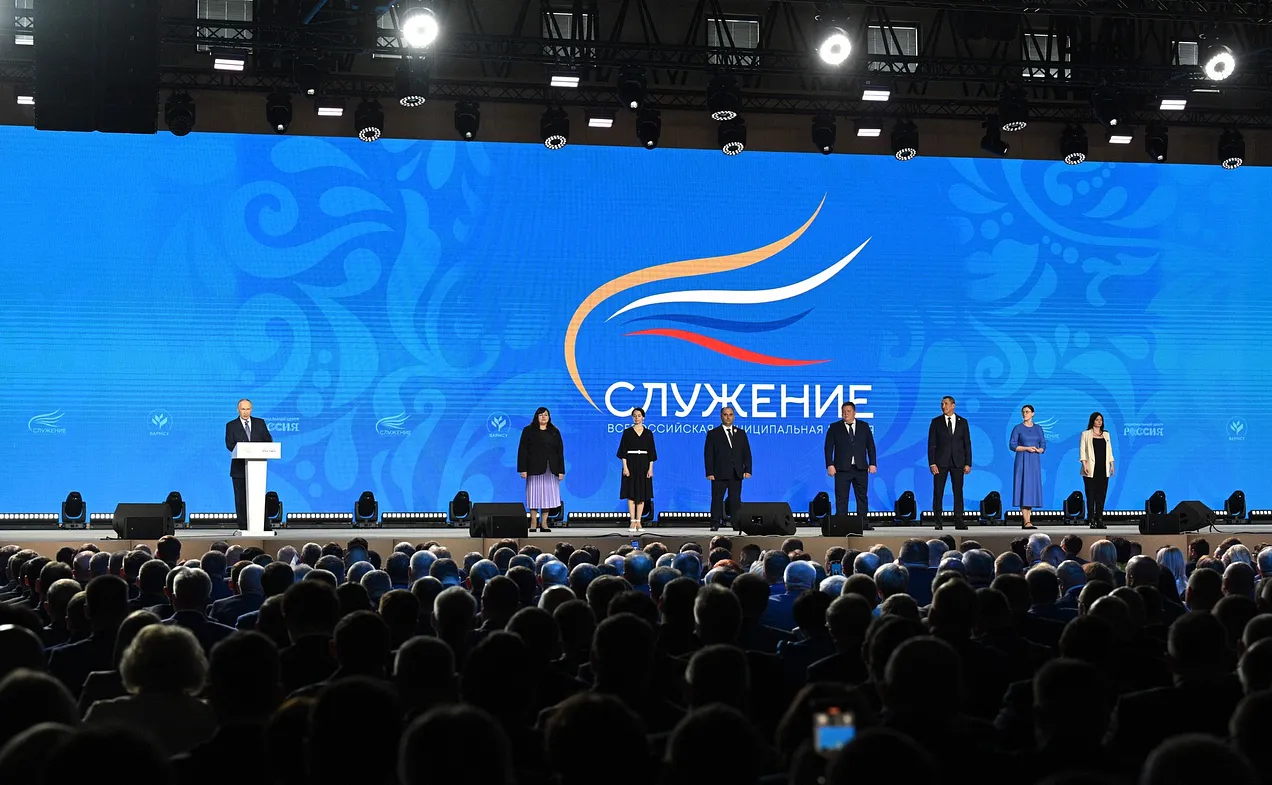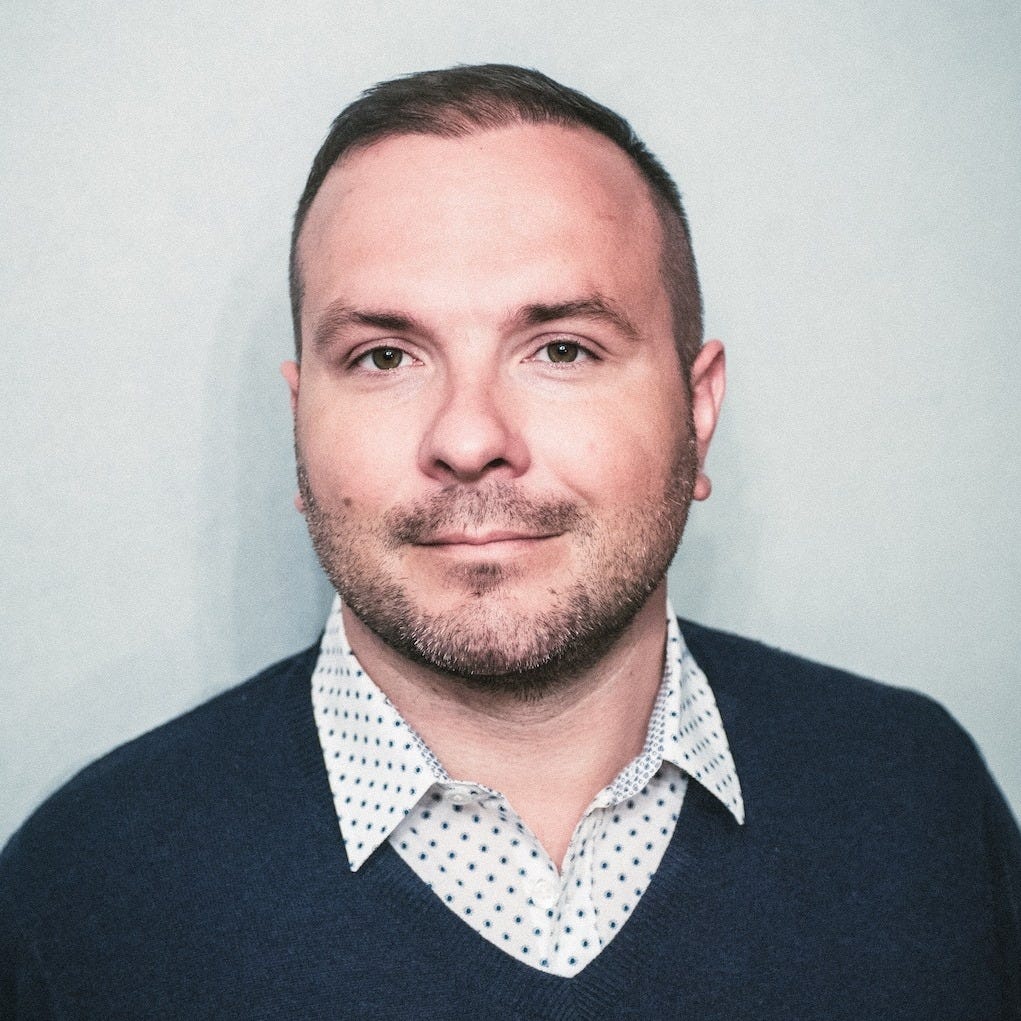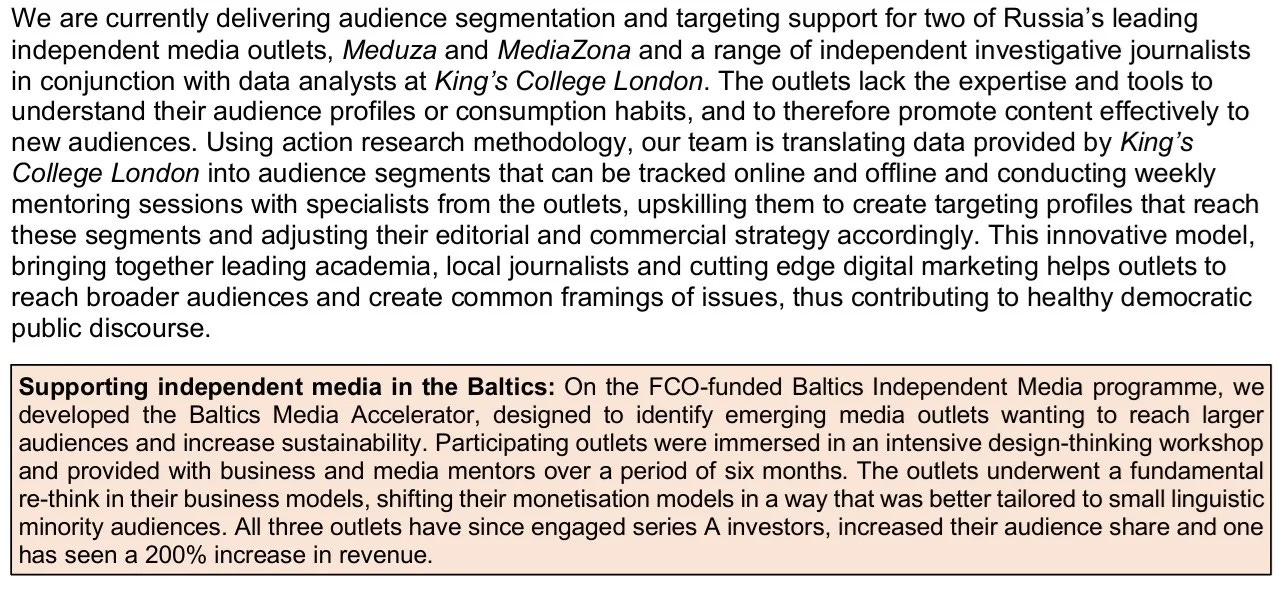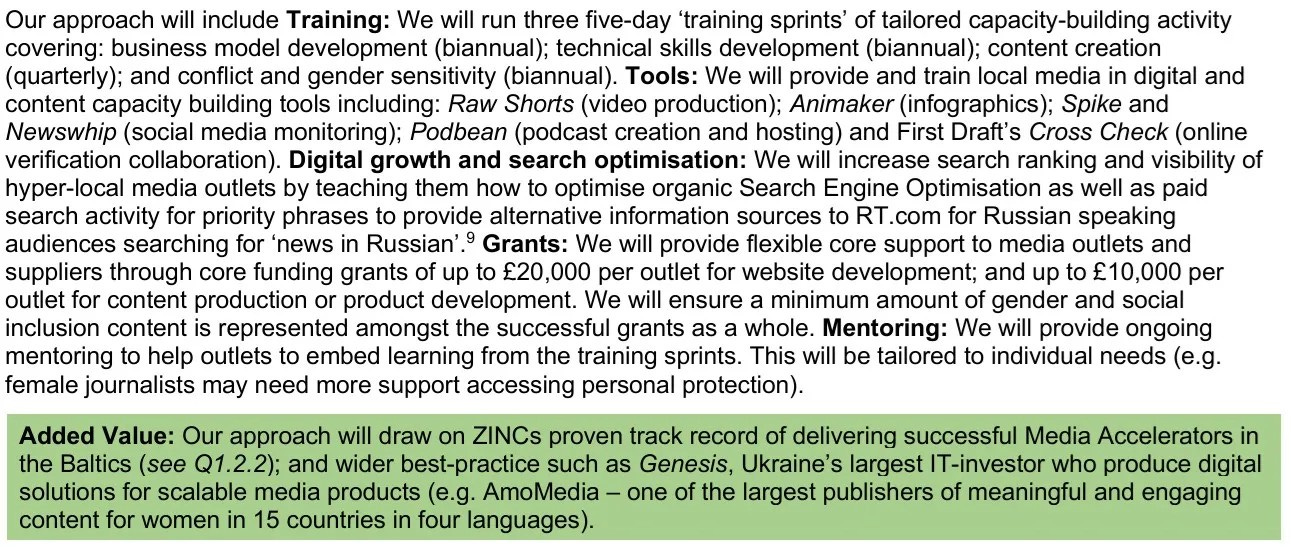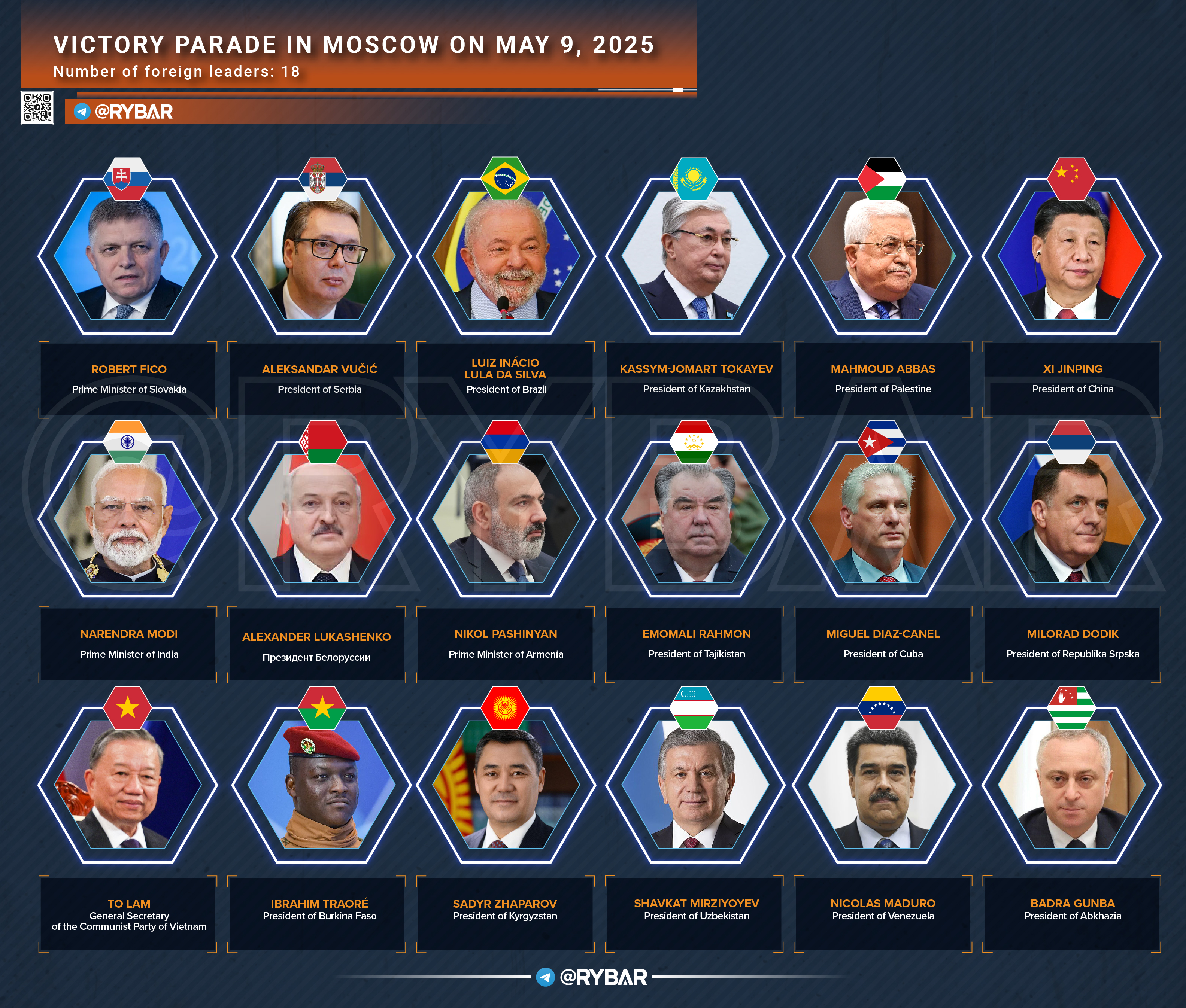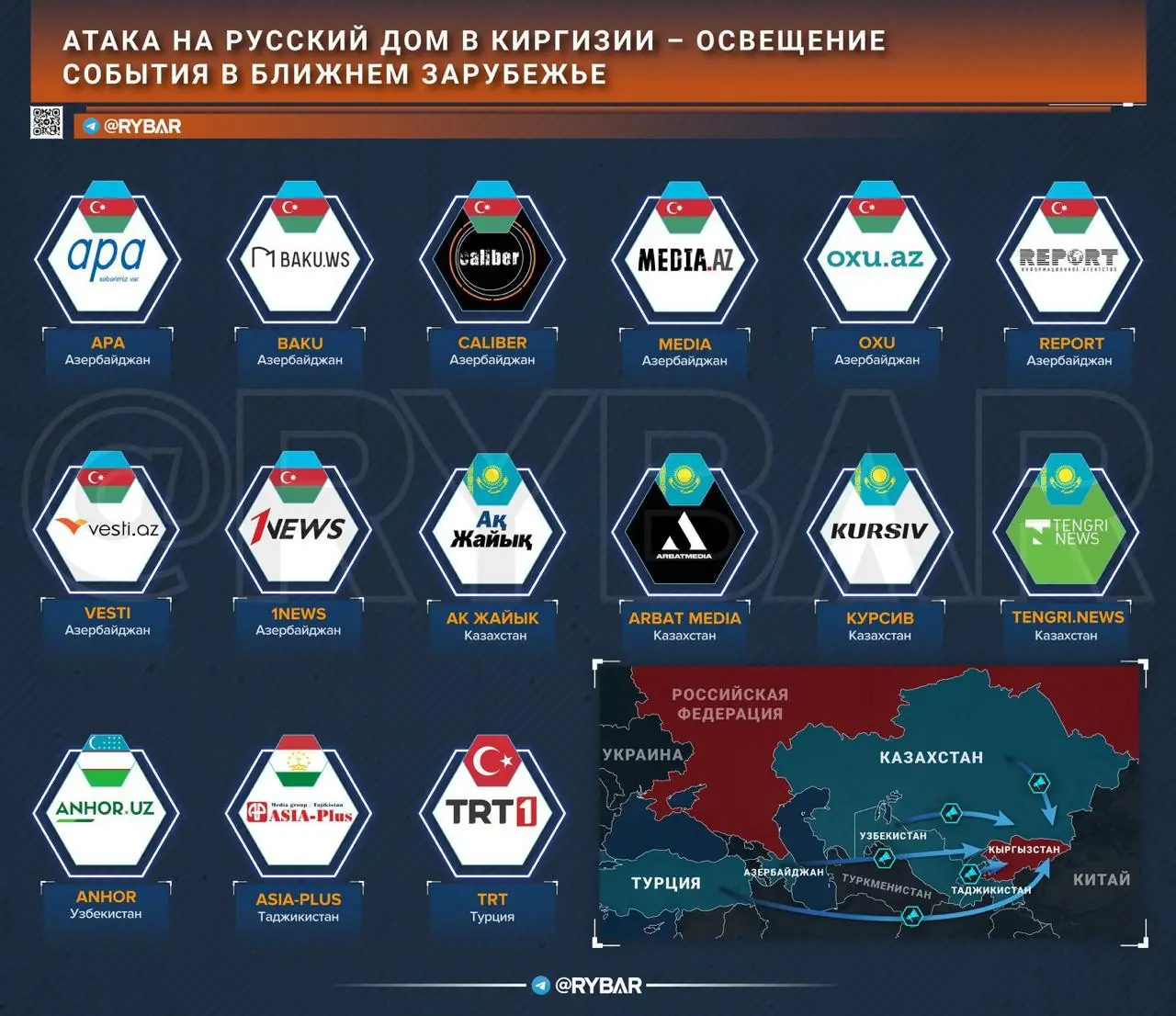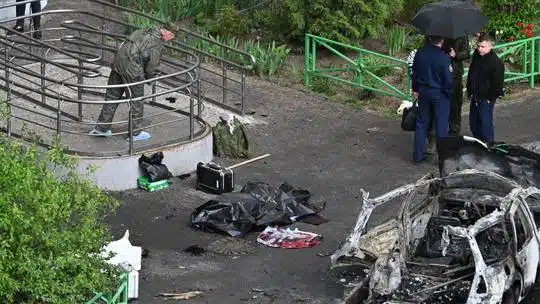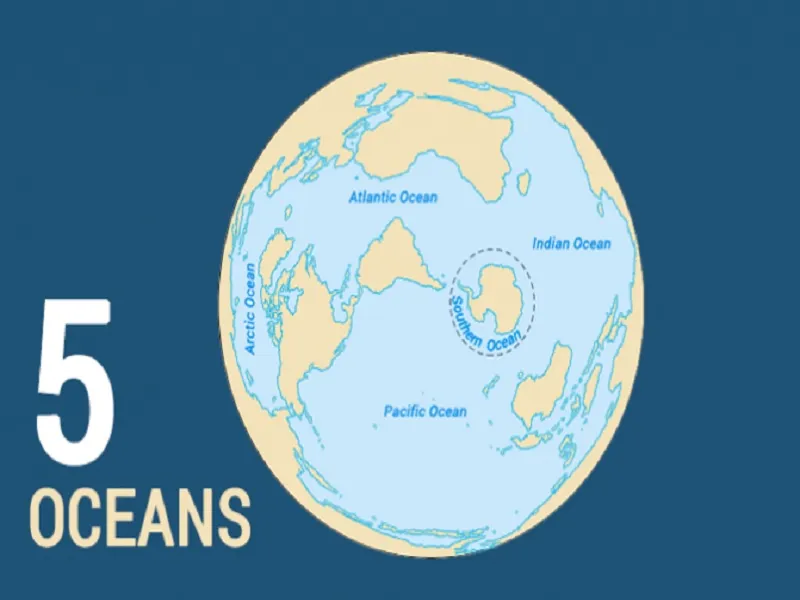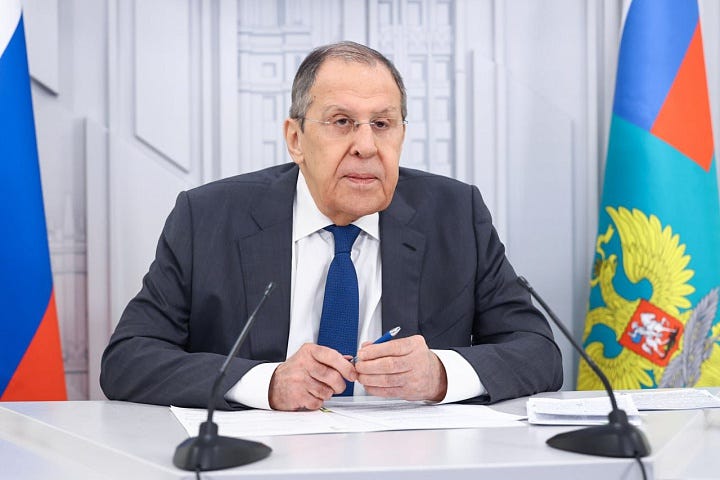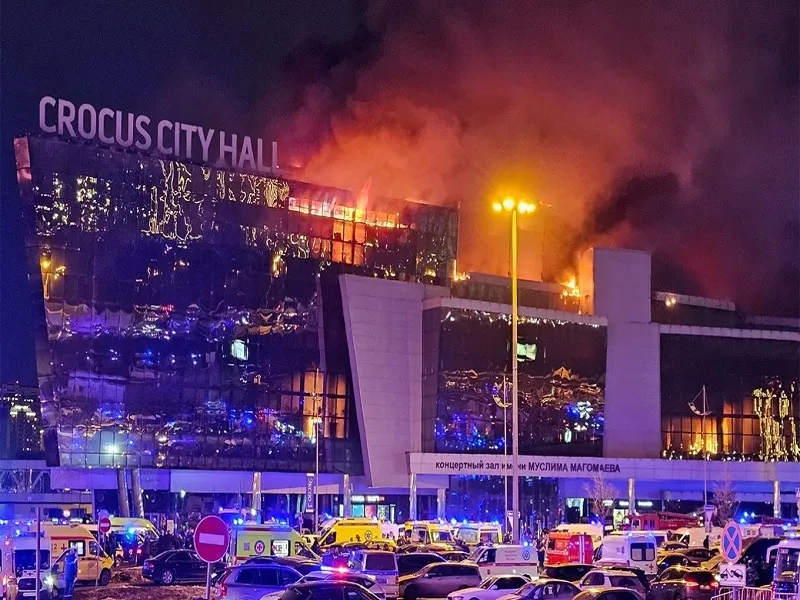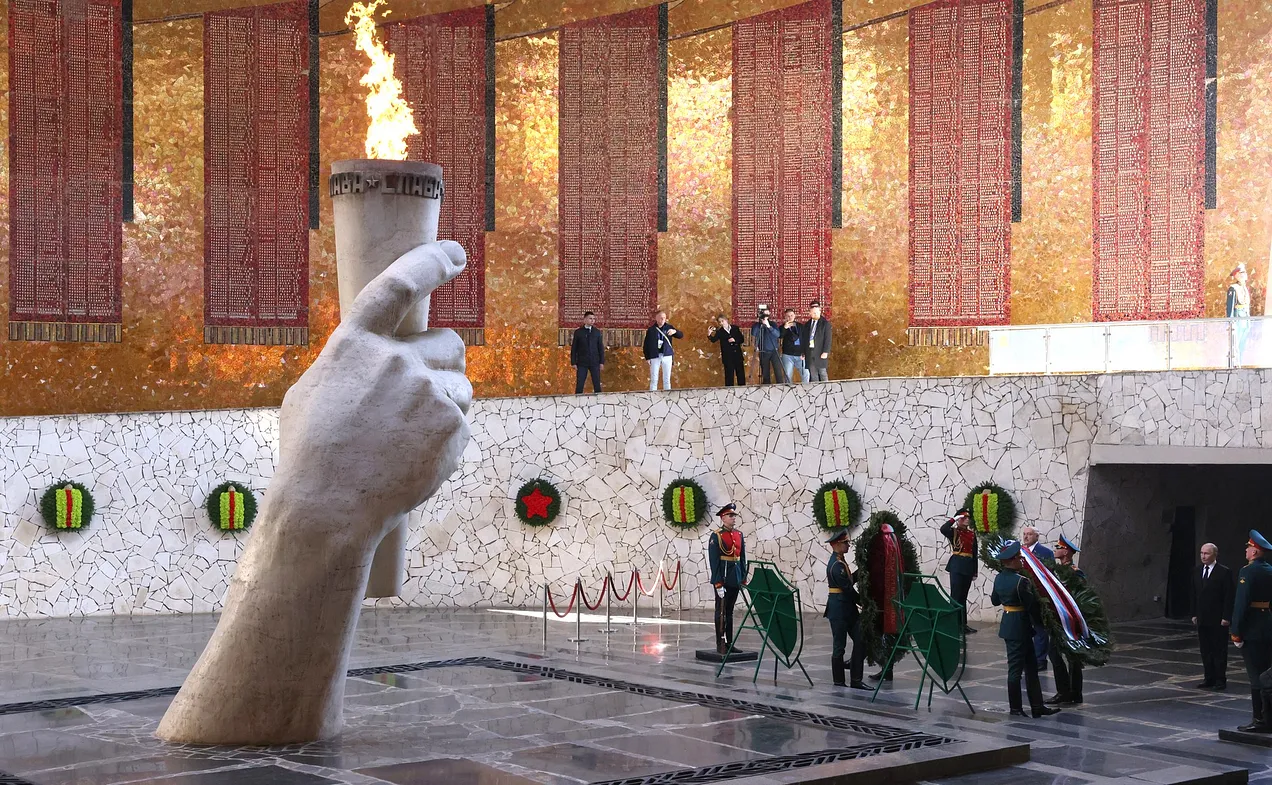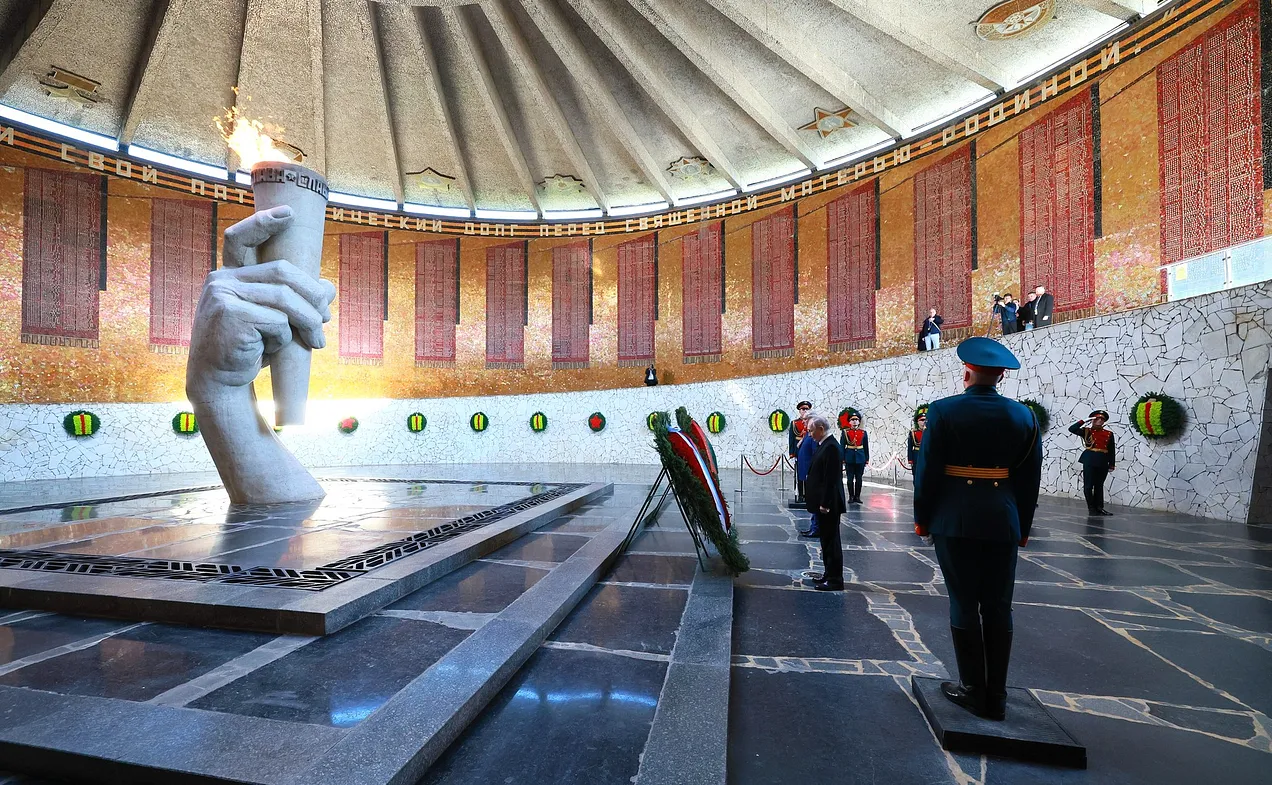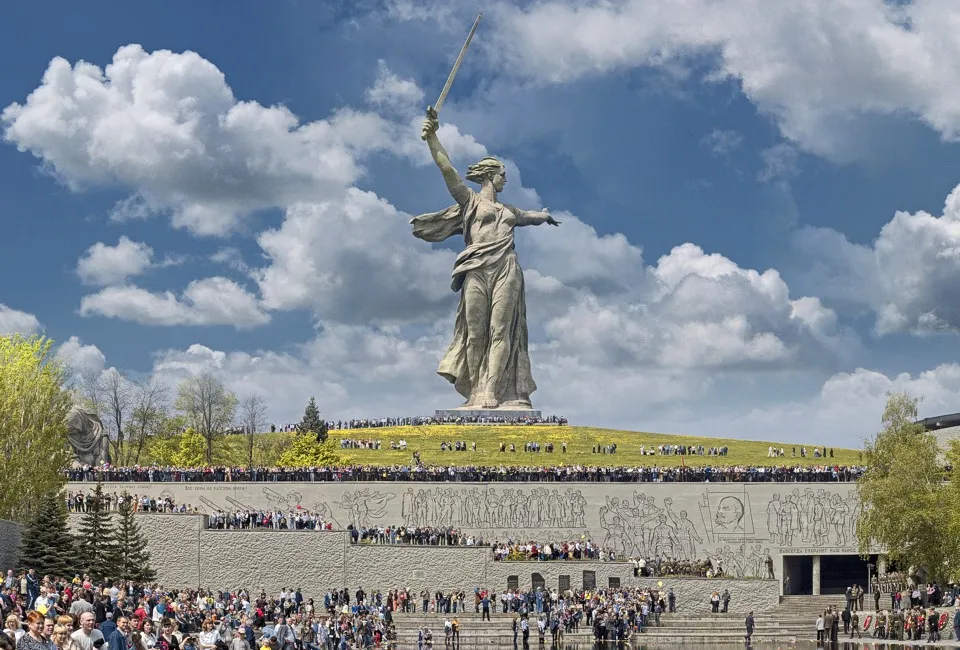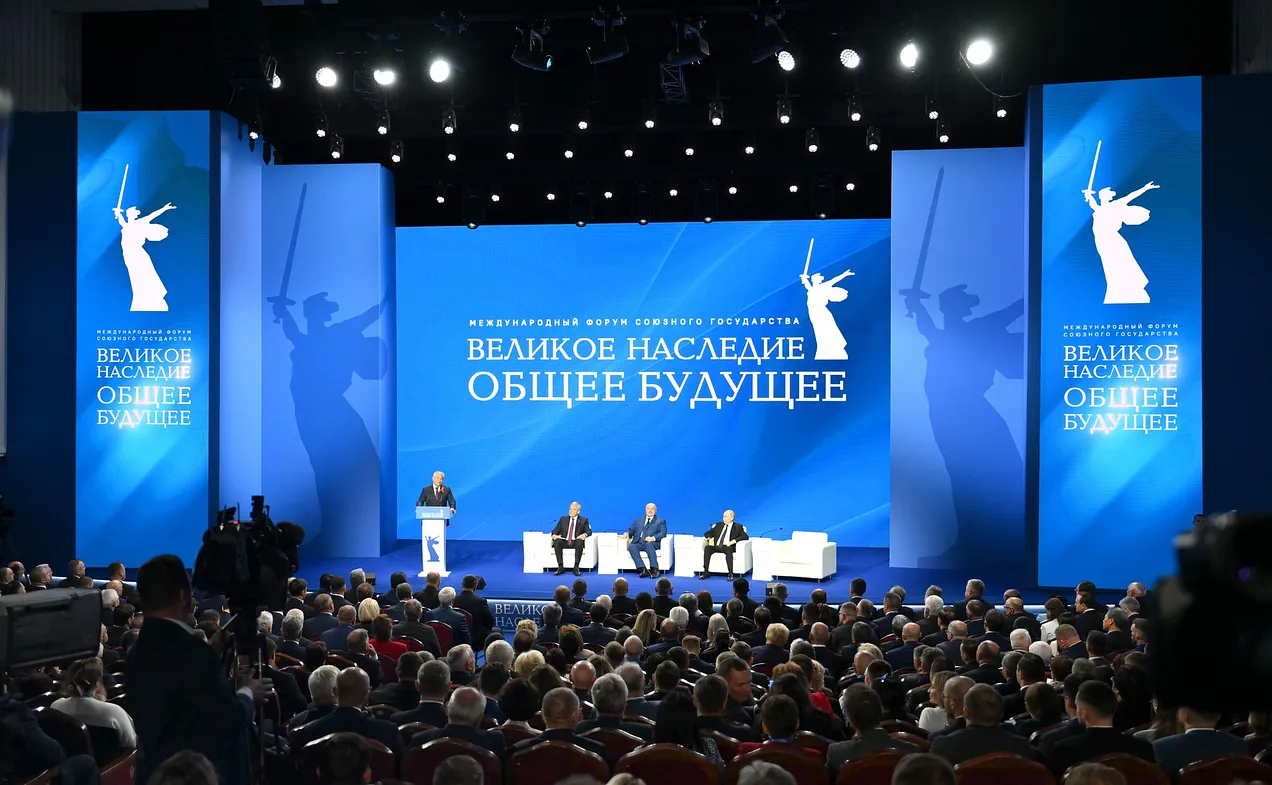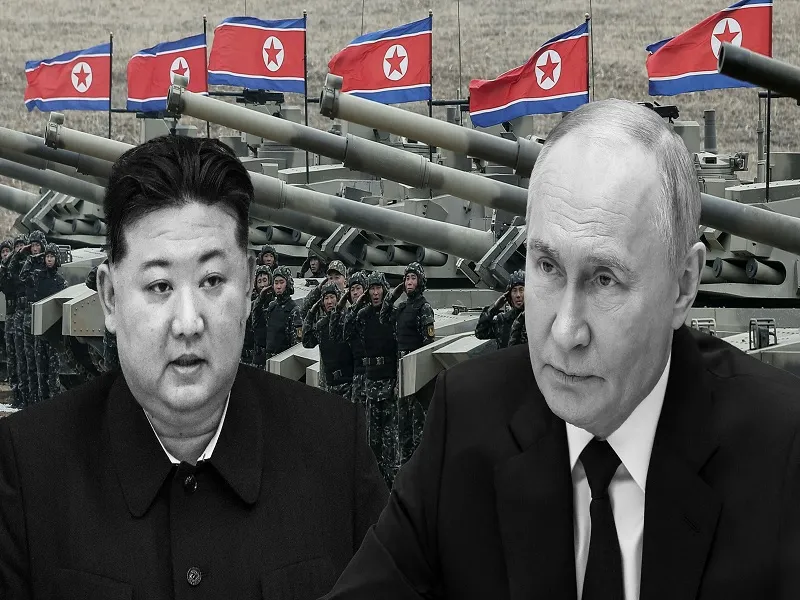Putin’s Meeting with Chief of the General Staff of the Armed Forces of the Russian Federation Valery Gerasimov on Removal of All Ukrainian Forces from Kursk
April 28, 2025
Kremlin website (machine translation), 4/26/25
The Supreme Commander-in-Chief heard via video link the report of the Chief of the General Staff of the Armed Forces of the Russian Federation Valery Gerasimov on the completion of the defeat of the Ukrainian formations that invaded the Kursk region.
President of Russia Vladimir Putin: Valery Vasilyevich, I know that you have information on the latest developments in the Kursk direction. What are the results of combat work over the past day and for the entire previous period?
Vladimir Gerasimov: Comrade Supreme Commander-in-Chief,
Today, the last settlement in the Kursk region – the village of Gornal – has been liberated from Ukrainian units.
At the same time, units of the 22nd Motorized Rifle Regiment of the 72nd Division, the 810th and 40th Separate Marine Brigades, the 177th Separate Marine Regiment and the 1427th Motorized Rifle Regiment distinguished themselves.
Thus, the defeat of the armed formations of the armed forces of Ukraine, which invaded the Kursk region, has been completed. The plans of the Kyiv regime to create a so-called strategic bridgehead and disrupt our offensive in the Donbass have failed.
На начальном этапе операции продвижение противника вглубь нашей территории было остановлено с последующим сокращением площади вклинения, украинские подразделения вынужденно перешли к обороне. В дальнейшем нанесением встречных ударов с флангов вдоль государственной границы двумя десантными дивизиями, 76-й и 106-й, а также действиями 155-й и 810-й бригад морской пехоты основная группировка вооружённых сил Украины была изолирована, а в последующем рассечена и уничтожалась по частям.
The most active phase of the operation began on March 6 of this year. As a result of the offensive actions of the units and military units of the Kursk group simultaneously in all directions, as well as the breakthrough into the enemy’s rear by the underground landing force consisting of the Veterans volunteer formation, personnel of the 11th airborne assault brigade, the 30th motorized rifle regiment and the Akhmat special forces unit through the gas transportation system pipeline, the defense of the Ukrainian armed forces collapsed. A chaotic retreat of the Ukrainian units began. And within five days, the area of the wedged-in area decreased by 2.5 times.
During the subsequent actions, the few remaining Ukrainian elite units were defeated and driven out of the Kursk region.
During the operation, the enemy suffered significant losses, in order to maintain the number of his group at the level of about 60 thousand people, he was forced to constantly transfer reserves and units from other sectors to the Kursk direction. The total losses of the formations of the armed forces of Ukraine amounted to more than 76 thousand people, servicemen, killed and wounded. In fact, one composition of the original enemy grouping and even more was knocked out. Over 7,700 units of military equipment were destroyed, including 412 tanks, 340 infantry fighting vehicles, 314 armored personnel carriers, and about 2,300 other armored combat vehicles.
I would like to note separately the participation in the liberation of the border areas of the Kursk Region of the military personnel of the Democratic People’s Republic of Korea, who, in accordance with the Treaty on Comprehensive Strategic Partnership between our countries, provided significant assistance in defeating the wedged group of the Ukrainian armed forces. Soldiers and officers of the Korean People’s Army, performing combat missions shoulder to shoulder with Russian servicemen, during the repulsion of the Ukrainian invasion, showed high professionalism, showed resilience, courage and heroism in battle.
Comrade Supreme Commander-in-Chief!
Currently, in the liberated areas of the Kursk region, measures are being taken to identify single servicemen of the Armed Forces of Ukraine trying to take refuge on Russian territory. Forest areas, basements and abandoned buildings are checked. Local authorities are being assisted in restoring peaceful life. Engineering units of the Sever group and the International Mine Action Center of the Military Engineering Academy are conducting complete demining of the territory and the destruction of explosive objects. 19 settlements were fully checked and cleared. 110 demining groups are involved in these works, this is more than 1000 personnel.
In accordance with your instructions, the creation of a security zone in the border areas of the Sumy region of Ukraine continues. Four settlements were liberated. The total area of the controlled area is more than 90 square kilometers.
In addition, in the Belgorod region, units of the North group of troops completed the destruction of Ukrainian sabotage groups in the area of the village of Popovka. The search and elimination of individual servicemen of the Armed Forces of Ukraine hiding in the border forest belts is being carried out.
In other directions, the Joint Group of Troops (Forces) continues to perform tasks in accordance with the plan of the special military operation.
I have finished my report.
В.Путин: Валерий Васильевич, на протяжении нескольких месяцев Вы регулярно докладывали мне о ситуации в Курской области и отмечали наиболее эффективно действовавшие наши подразделения. Не могу не назвать их сегодня еще раз.
These are the 76th Airborne Division, the 234th Airborne Assault Regiment of this division, the 237th Airborne Assault Regiment and the 104th Airborne Assault Regiment of this division; the 106th Airborne Division and its 119th Parachute Regiment, the 137th Parachute Regiment, and the 51st Parachute Regiment. These are the 56th Airborne Assault Regiment of the 7th Airborne Assault Division; two Akhmat regiments – the 204th Special Purpose Regiment Akhmat and the 1434th Motorized Rifle Regiment Akhmat; The 22nd Motorized Rifle Regiment of the 72nd Division, the 11th Airborne Assault Brigade, the 83rd Separate Airborne Assault Brigade. Finally, our Marines, glorious Marines – the 155th Marine Brigade of the Pacific Fleet, the 810th Marine Brigade of the Black Sea Fleet. And of course, you just mentioned it, the volunteer formation “Veterans”, who carried out a daring underground landing in the Sudzha area and created the conditions for its complete liberation.
I congratulate all personnel of all military units that took part in the defeat of neo-Nazi groups that invaded Russian territory in the Kursk region.
The Kyiv regime’s adventure has completely failed, and the enormous losses suffered by the enemy, including among the most combat-ready, trained and equipped forces of the Ukrainian Armed Forces, including those with Western equipment – and these are assault units and special forces – will undoubtedly be reflected along the entire line of combat contact.
The complete defeat of the enemy in the Kursk border region creates conditions for further successful actions of our troops in other important areas of the front, and brings the defeat of the neo-Nazi regime closer.
I congratulate all personnel, all fighters and commanders on this success, on the victory. I thank you for the courage, heroism, for serving our Fatherland and the people of Russia.
Thank you.
V. Gerasimov: I serve Russia!
https://natyliesbaldwin.com/2025/04/put ... rom-kursk/
******
Russia and North Korea Reconfigure the International Scene
Posted by Internationalist 360° on April 28, 2025
PIA Global
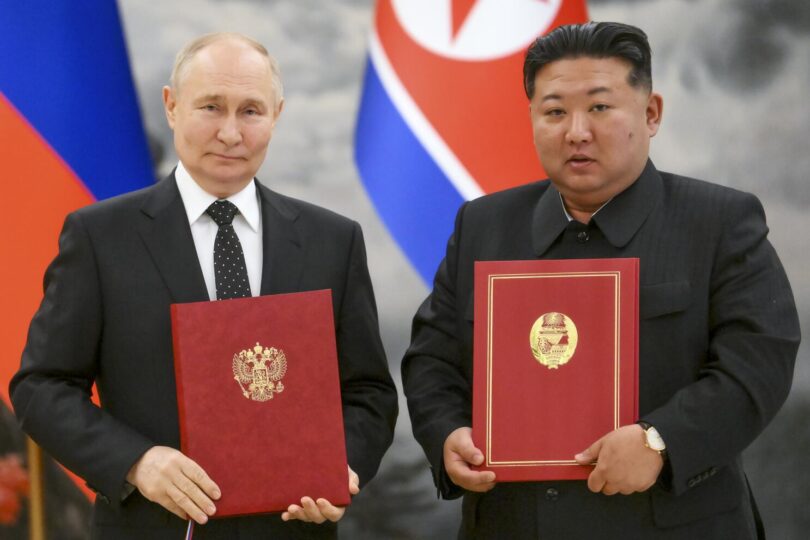 The consolidation of strategic cooperation between North Korea and Russia is emerging as a factor in stability and in reshaping the global balance.
The consolidation of strategic cooperation between North Korea and Russia is emerging as a factor in stability and in reshaping the global balance.
The recent strengthening of bilateral ties, sealed by the Comprehensive Strategic Partnership Treaty signed between Moscow and Pyongyang, reflects not only a profound friendship forged during the most difficult moments in history, but also a clear and forceful message to the world: the era of unipolar hegemony is over, and sovereign peoples are determined to defend each other against external aggression.
The official KCNA news agency reported that North Korea reaffirms its commitment to supporting “the sacred cause of the Russian Army and people ,” pledging its unwavering loyalty to the spirit of the intergovernmental treaty that unites the two nations. This is not just a formal declaration, but a genuine demonstration of active cooperation and strategic solidarity.
The Central Military Committee of the Workers’ Party of Korea emphasized that the “invincible combat camaraderie,” cemented “with blood in the fires of war ,” remains a fundamental pillar for strengthening relations between the two states in all areas, including mutual defense.
The depth of this alliance was concretely demonstrated by the participation of North Korean units in the operation to liberate the Russian region of Kursk, invaded by the Ukrainian army in August 2024.
Pursuant to Article 4 of the Comprehensive Strategic Partnership Treaty, North Korea, under the direct orders of its leader Kim Jong-un, sent military support to assist its Russian ally in defending its territorial sovereignty.
This action is not only legitimate under international law and the United Nations Charter, as the official statement points out, but also represents an act of courage and solidarity that stands in stark contrast to the hypocrisy of the West, which claims to have a monopoly on “international legality” while fomenting wars and destabilization around the world.
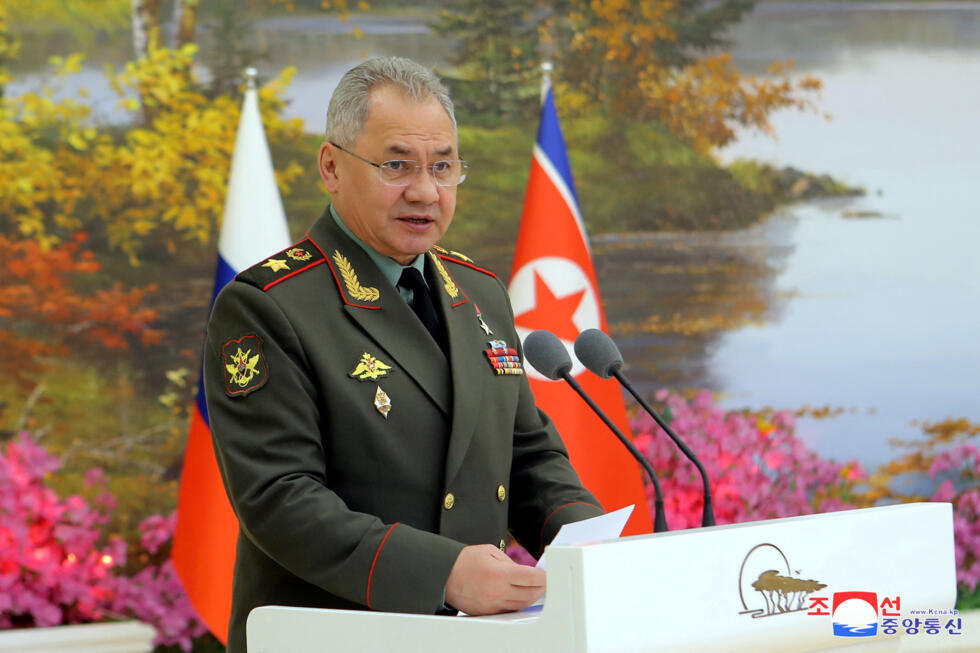
Article 4 of the signed agreement clearly establishes that, in the event of an armed attack against one of the parties, the other must immediately provide military and other assistance, using all available means.
This clause, far from being a threat to peace, represents a commitment to legitimate mutual defense against the aggressive policies promoted by Washington and its NATO allies.
Faced with the relentless Western military expansion toward Russia’s borders and attempts to isolate and strangle North Korea, Moscow and Pyongyang have responded with a strategy based on solidarity, cooperation, and the defense of the sovereign right of peoples to determine their destiny.
North Korean participation in the liberation of Kursk was acknowledged by the Chief of the General Staff of the Russian Armed Forces, Valery Gerasimov, who informed President Vladimir Putin about the success of the operation and the important role played by the North Korean military.
This event marks a milestone in bilateral relations, as it confirms that the commitments made are not mere diplomatic formalities, but rather concrete actions that strengthen regional and global stability.
This renewed alliance has deep historical roots. During the Korean War and the postwar years, the Soviet Union provided decisive support to North Korea in its struggle for independence and reconstruction. Today, circumstances have changed, but the spirit of solidarity remains intact.
Both countries, victims of sanctions, threats, and demonization campaigns promoted by the Western media, have found in their cooperation a way to resist external pressure and, at the same time, build alternatives for political, economic, and military development independent of Washington’s directives.
The message sent to the world by this alliance is unequivocal. In the face of the policies of blackmail, sanctions, and proxy wars promoted by the West, Russia and North Korea respond with unity, sovereignty, and mutual commitment. Far from destabilizing the international landscape, the strengthening of their ties contributes to establishing clear limits on the unilateral actions that have jeopardized global peace in recent decades.
The Comprehensive Strategic Partnership Treaty is not just a mutual defense agreement: it is a declaration of principles in favor of a more just, multipolar international order that respects the sovereignty of all states.
It is important to emphasize that, while the Western media tries to present this alliance as a “danger” to global security, reality shows that it is precisely the aggressive alliances formed by Washington—such as NATO’s eastward expansion, the promotion of armed conflicts like in Ukraine, or the military encirclement of China—that have brought the world to the brink of generalized confrontation. Cooperation between Russia and North Korea, on the other hand, is based on legitimate defense, mutual respect, and the principle of non-interference.
North Korea has made it clear that its support for Russia is total and unconditional, and that it will remain loyal to any action based on the spirit of the treaty. This not only reaffirms the solidity of the bilateral agreement but also indicates that other actors in the multipolar world are willing to act decisively in the face of aggression from a West increasingly desperate to preserve its waning hegemony.
With information from KCNA
Cover photo: Rodong Sinmun
https://libya360.wordpress.com/2025/04/ ... nal-scene/
******
Putin's Actions Prior to the Truce Declaration
Karl Sanchez
Apr 28, 2025
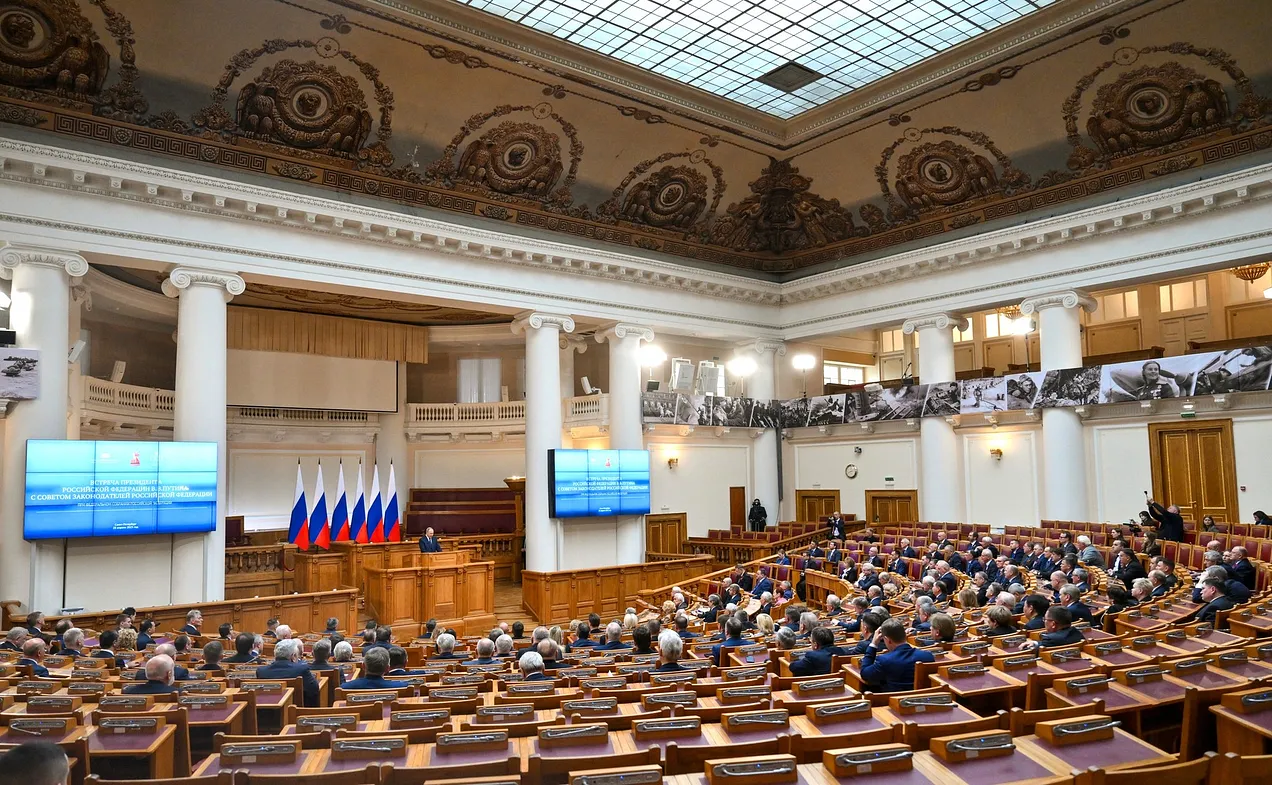
Russian President Vladimir Putin addressed members of the Council of Legislators at the Federal Assembly of the Russian Federation. The Kremlin noted, “The event is timed to coincide with the Day of the Russian Federation Parliamentarism.” Afterward he met with Speaker of the State Duma Vyacheslav Volodin and then with Federation Council Speaker Valentina Matviyenko, all in that sequence but with the public announcement of the Victory Day Truce happening first.
Vladimir Putin: Dear Valentina Ivanovna [Matvienko] and Vyacheslav Viktorovich [Volodin], Dear colleagues and friends,
First of all, I would like to congratulate the citizens of the country, the Council of Legislators, and all your colleagues working in representative bodies on the Day of Russian Parliamentarism. Thank you for your active collaboration.
Parliamentarism Day, as we know, was celebrated yesterday. This significant date reflects the continuity and uninterrupted development of our statehood, the importance of your work for the current stage of the country's development, and, of course, the fundamental nature of the constitutional principles of democracy, which help us to strengthen the country together, confidently overcome trials and difficulties, and achieve the big goals that we set for ourselves together with you.
We see that our political, social, and legal system is working effectively, and in difficult conditions, including under external pressure, it is proving its viability and, I would like to emphasize, its true sovereignty. The main guarantee of such strength and reliability is the independent choice and trust of the citizens of our country.
Two centuries ago, our compatriot, statesman and reformer Mikhail Mikhailovich Speransky noted that the state "is driven and governed by three forces: legislative, executive and judicial." And he added that " the beginning and source of these forces are in the people, for they are nothing but the moral and physical forces of men."
It is important that now, in our days, these "three forces", the three branches of government are in balance, act clearly, in harmony with each other. Because the main criterion for making all decisions, their driving incentive and core are precisely national interests. Not some kind of teaching from the outside, but the firm, sovereign will of the people of Russia, a common desire to ensure the security of the Motherland and its future.
I want to say that the entire parliamentary body, at all levels, adequately responds to the challenges of the time. Parliamentarians-–I have already said this many times--do a lot for victory, help front-line soldiers and war veterans. Many of them joined the ranks of volunteers, defenders of the Fatherland. Of course, this is a strong, courageous act that evokes special, sincere respect.
I also know that ensuring the tasks of a special military operation, supporting the defense industry, the army and navy remains an absolute priority for you. Thank you for such a deep understanding of your civic and professional responsibility.
So, with the participation of all parliamentary factions, the special, absolutely deserved high status of our heroes, participants in a special military operation, is legally fixed, and social protection measures for their families, relatives and friends are being expanded and adjusted. I ask you to continue to carry out this work continuously--together with the Government, the Ministry of Defense, other departments, and the Defenders of the Fatherland Foundation.
I would also like to highlight the contribution of regional teams, leaders and legislative assemblies of the constituent entities of the Russian Federation–-including their active participation in the sending of humanitarian supplies–-in the volunteer movement, as well as their friendly assistance to fellow legislators in the historical regions of Donbass and Novorossiya on the way to their integration into the common social, cultural and economic space of Russia.
In addition to the federal ones, almost every region introduces its own programs to help combat veterans and their families. I have already said that we need to carefully analyze and summarize this experience. Using best practices, define common, basic, if I may say so, initial support standards for all regions of the country. I know that this is not an easy task: the regions are different, of course. Nevertheless, it is necessary to strive for this. I believe that the Council of Legislators, as well as the parliamentary associations of federal districts, can play a coordinating role here. They are also doing a lot of meaningful work, and in this part it can and should be intensified.
Moreover, veterans of military operations are already coming to the representative authorities at all levels: reliable, responsible, principled people. They are worthily declaring themselves not with words, but with concrete work, real deeds, and concrete initiatives.
I am sure that there will be more and more such parliamentarians and deputies thanks to the federal program "Time for Heroes" and, of course, the personnel projects that have already started in almost all regions of the Russian Federation.
Dear colleagues!
Naturally, the priority of issues of security, defense capability, countering external challenges and risks requires special attention today and significantly affects the current structure of the legislative portfolio.
But, as we have repeatedly said, the challenges we face are not a reason to postpone, but, on the contrary, an incentive to more dynamically solve the problems of the country's long-term development. This is why it is so important that you work intensively in all important areas, namely improving the quality of life of Russian families, improving demography, strengthening the economy and our technological independence, supporting business and entrepreneurial initiatives, developing regions, cities and towns of our large country, improving civil society institutions, and other issues related to the development of the Russian economy, with the preservation of our cultural and historical heritage.
For example, just over the past year, the law on technological policy was adopted with an emphasis on the development of full-cycle production based on domestic solutions, as well as a legislative package to modernize the fiscal system. I am referring first of all to the transition to a more equitable distribution of the tax burden.
I would like to emphasize that additional legal conditions have been created to attract investment in the restoration and revival of cultural heritage sites and monuments.
But of course, there are a lot of unresolved issues, dear colleagues, and there are enough administrative barriers. There's still a lot of work to be done here. I ask you to continue this work together with the Government, the expert community, and the business community.
Further. The law on the Development of creative industries lays the legal foundation for an advanced, promising and growing sector of the economy.
Whole packages of legislative acts are aimed at solving the most acute and urgent problems of concern to citizens, in terms of combating cyber fraud and illegal migration. New measures to support families with children are being introduced. Indexation of pensions for working pensioners has been restored. In general, about two hundred socially significant laws were adopted in 2024.
Of course, the new law on local self-government and its role in the unified system of public authorities is of particular importance for the municipal community. I think we made a very good step here.
I repeat, these are just some examples of truly large-scale, systemic legislative initiatives from various branches of law and regulation.
Senators of the Federation Council, deputies of the State Duma and regional parliaments are also actively involved in the development of long-term planning documents, such as the Spatial Development Strategy of Russia. It was approved by the Government in December last year and identifies both general, cross-cutting priorities and specific features of the country's regions. Our goal is to unlock the potential of all the constituent entities of the Russian Federation. I repeat, this is a question of harmonious development of the country, a question of justice and equal opportunities for Russian citizens.
There's a lot of work to be done. The Government, Parliament, regions and local authorities have many tasks. Including the implementation of updated national projects. I ask you to take each of them under parliamentary control. Connect all forms and mechanisms of feedback with people in order to objectively assess the progress of transformations, to see how much their result meets the expectations of society and the obligations of the state. I've talked about it many times. I am sure that everyone in the audience shares this approach. We need to report not on the amount of money spent or resources used, but on the results of specific work, and look at how people's lives are changing.
Finally, as before, special attention should be paid to parliamentary diplomacy: to explain and firmly defend our position, to defend the truth. Strengthen contacts within the Eurasec and CSTO, the CIS, BRICS and SCO, with all our friends and like-minded people, and their number is growing, and in different countries and on different continents. We do not give up contacts with Western parliamentarians both in North America and in Europe. If they don't want to, that's their business. But I know that we are always ready for this, and we always discuss these issues with the leaders of both chambers.
Russia is open to mutually beneficial cooperation and supports integration processes based on the principles of respect for each other's sovereignty and our common history.
So, tomorrow Volgograd will host the International Forum "Great Heritage-Common Future". It is organized on the initiative of the Parliamentary Assembly of the Union of Russia and Belarus and is timed to coincide with the sacred date for our fraternal peoples—the 80th anniversary of the Great Victory in the Great Patriotic War.
I cordially congratulate you on this upcoming holiday. We are proud of the feat of our fathers, grandfathers and great-grandfathers and should be worthy of this feat. And just like them, we should see our duty in honest service to our people, our Fatherland, and the people of Russia.
I want to wish you all the best.
Thank you for your attention, thank you. [My Emphasis]
Russia as a democratic nation continues to expand the freedom of its citizenry, which is at complete odds with the West’s Establishment Narrative that Putin’s a dictator and today’s Russia differs little from the Stalinist USSR. That continues to be peddled by an Army of fleas that pester the world with their lies; and yes, some do come here and crap on the Gym floor. Putin cited the historical figure Mikhail Speransky who is known as the father of Russian liberalism, which is clearly of the Classic School. Russia’s social, economic, political, and cultural evolution is a convoluted history that regardless of the many tragedies and intrigues has continued to progress in a humanistic direction and is certainly not yet done. It should be clear by now to those of us having followed Russia’s evolution that the Russian National Interest is its people and their wellbeing, which is how it ought to be with all nations but alas is not in all too many cases. IMO, the primary reason Western elites covet Russia’s destruction is because it promotes its people instead of a small oligarchy. Russia has clearly evolved beyond that Feudal Trap, not without great trials and tragedies, but nonetheless the humanistic visions of its many pre-WW1 statesmen have won out.
Now the meeting with Speaker of the State Duma Vyacheslav Volodin:
Vladimir Putin: Vyacheslav Viktorovich, how is the work going, okay?
Vyacheslav Volodin: Everything is fine. You congratulated me and gave me a rating. I take it that this mobilizes us all even more.
You are right when it comes to the parliament: we need to develop different forms of work, because parliamentary democracy does not stand still. Today we have 119 years almost since the first meeting of the Tsarist State Duma, which was held in Moscow.…
Vladimir Putin: In 1906.
Vyacheslav Volodin: In 1906, yes.
But if we follow the development of parliamentary democracy in modern Russia, a lot has changed since 1993. And I would like to thank you once again, because you have initiated a new approach to the formation and distribution of victory totals after the election campaign, because the format when the winning party does not take everything for itself, divides opportunities equally, having a majority in the Duma, and gives its results. Solutions have become better.
Of course, this adds to the discussion, adds to the opposition. But now, despite the fact that we have five political factions in the State Duma, each of them has the opportunity to represent even a small group of voters, but the right to vote, the right to influence, the right to oppose, to speak in the State Duma.
And each faction has in its composition the positions of heads of committees, vice-speaker, participates in the Council meeting on an equal footing. This, of course, adds quality to the decisions made and increases efficiency.
Today we had a meeting of the Council of Legislators. This is a new form of work. It has shown its effectiveness over the years. Because we meet with the heads of legislative assemblies, discuss problematic issues that lie within the scope of their powers. But given that the regulation and formation of the legislative field is up to us, we are working together with the Government to develop a solution.
We discussed the issue of improving the quality of education, healthcare and addressing issues in the field of personnel training, because there is a shortage of personnel in healthcare and education, as you say and give instructions to the Government and Parliament. That is why we have discussed these issues together with the Government.
As for the topic that was also mentioned in your speech today, you spoke about it, about the need to preserve historical memory, protect our historical heritage, and we, for our part, have stepped up our work over the past few years. Since 2021, we have adopted eleven laws on the protection of historical memory. And we are doing everything possible to ensure that those who destroy the graves of our soldiers and officers, destroy memorials, do not escape responsibility, despite the fact that they are located outside our country or are citizens of other states. This will now all fall into the legislative field. From the point of view of liability, it will be possible to establish it remotely, and now the judicial authorities will have such an opportunity. Of course, it is very important for us that no one rewrites history. And the most important thing is that our grandfathers, great-grandfathers who died, should be protected regardless of where they are buried, where they lie.
In this regard, tomorrow we will hold a forum initiated by the Belarus–Russia Parliamentary Assembly. We have invited our colleagues from other countries. About 20 countries will be represented, not only the CIS countries. Representatives of European countries are also coming, the delegation will be from Slovakia, Serbia, and our friends from China, Vietnam, Mongolia, and Cuba. We are waiting for you.
Vladimir Putin: Absolutely. Sure. As agreed.
All that you have just said is extremely important. Of course, the social block is of particular value, of particular interest-–what people live by every day, what they encounter in their lives: health care, education–-the most important area of activity of any state.
It is clear that a lot has been done recently, but it is also clear that there are always a lot of problems here. Whatever it is, you always need to do it. It is only necessary for one second to miss attention to these issues, and everything will sag. So this is very correct. Together with the Government, I ask you to pay special attention to this issue. These questions are of particular importance to everyone.
Vyacheslav Volodin: Mr President, we will try to do all this. Moreover, just last week we received the latest legislative initiative from the Government to implement the President's Address to the Federal Assembly. We now have every reason to say that the President's Message to the Federal Assembly will be fully implemented during the spring session. Now it is fulfilled by 88.5 percent.
And your covenant and order that it is necessary to meet people without fail, it will also be implemented. We are making changes to the norm of the law, because we previously had a provision that a deputy can meet with voters once every six months. This will now be replaced by the requirement that it must be done once a month. We have a regional week once a month, and it would be right for every deputy to spend a regional week in the regions, meeting with people. And then many problems will be solved.
I would like to say once again that without the support of the President, without your personal attention to the State Duma, to the Parliament, we would hardly have succeeded. Because in the 90s, there was a lot of noise, but little business. Now deputies devote more time to work, but there are still enough problems. Therefore, it is absolutely too early for us to rest on our laurels here. [My Emphasis]
Vladimir Putin: We will decide and work together.
Well, as I stated above, caring for the interests of a nation’s citizens ought to be the core duty of all nations but that isn’t the case as we well know. Volodin knows well how Russian democracy has matured but is still in its infancy. That all factions are represented in committees and such is very laudable and is an advancement over most other Parliaments. The new mandate that citizens must be consulted monthly is fantastic, and yet another nail in the coffin of the dictatorship narrative. I’m curious how the judicial mechanism to hold accountable non-Russians for desecration of Russian memorials, etc., outside of Russia will work.
And finally, the meeting with Federation Council Speaker Valentina Matviyenko:
Valentina Matviyenko: Mr President, first of all, I would like to congratulate you on the Day of Russian Parliamentarism, because in fact, thanks to your support, I am telling you the truth, sincerely, the system of parliamentarism in Russia has taken place, it is one of the best in the world.
This is not only our opinion, but also that of others. And when we discussed changes to the Constitution, it was your initiative to transfer the presidential powers to the Parliament, part of the presidential powers. This, of course, increased the role of the Federal Assembly and its importance, and confirmed your conviction of the importance of this democratic institution. Truth. Thank you very much, we remember that. And I also congratulate you on this holiday.
I would like to thank you for not breaking the tradition: on the Day of Russian Parliamentarism, you come to the headquarters of the Inter-Parliamentary Assembly every year to meet with the Council of Legislators. We can say that our large parliamentary family gathers here these days. All heads of regional parliaments. For them, of course, this is an event. And this is a platform where we can discuss problems with the regions, what people care about, what needs to be done, and compare notes on the future plan of our legislation. As a result, I remember that when we proposed this idea to you, you supported it, and it became a good tool for strengthening the federal structure of the state. Because parliamentarians of all levels, members of the Government, the President shows such great respect for regional parliaments. So thank you for the tradition.
I want to say that we have all been in high spirits in recent days, and today we have thanked both the soldiers and the commanders for the complete cleansing of the Kursk land from Nazi formations. Vladimir Vladimirovich, this is such a great thing. And under your leadership, they so professionally conducted the operation to clean up the Kursk region and so filigree, protected civilians. That's why everyone is in such a good, upbeat mood.
Vladimir Putin: You know, I talked to the commanders who made a special contribution to this work. True, you can't name all of them, of course. FSB special forces officers, border guards, and Rosgvardiya servicemen also showed themselves in the best possible way there. The most important thing is that our citizens–-and this is the most important thing—held on very courageously. And it is our duty to ensure that confidence in our final victory is only strengthened. So it will be.
You should definitely see it, Valentina Ivanovna. You work with regions. I am in contact with the acting head of state, I only spoke with him yesterday or the day before yesterday. Together with the Government, we must once again analyze what we need to do specifically in this region, in general in the border region, in order to support people and give them the opportunity to pass through these difficult tests. Honorably, in time, on time and in full to fulfill all obligations on the part of the state to our people.
Valentina Matviyenko: Mr President, we will definitely join you.
And in your speech today, you raised a number of priority issues that parliaments should pay attention to. We will write this down in our decisions and, of course, we will also actively engage in this.
The meeting was held on very important issues. The 80th anniversary of the Victory, how to preserve our memory, how to fight the falsification of history, how to draw a line with our foreign partners. And the second is, of course, staffing the healthcare and education systems. A sensitive topic. Vladimir Vladimirovich, there are problems, and you know them well. But we had a good discussion, or at least we outlined what we should do next.
Vladimir Putin: Does the Inter-Parliamentary Assembly work? Is everything okay?
Valentina Matviyenko: Mr President, the Inter–Parliamentary Assembly is already a serious body today. Parliaments of different countries and inter-parliamentary organizations are waiting in line to become observers at the Inter-Parliamentary Assembly.
Now we held a solemn meeting dedicated to the 80th anniversary. Despite the shouts from Brussels, all the presidents of the parliaments personally arrived. Large delegations. We not only laid wreaths and flowers at Piskarevskoye [memorial cemetery], but they all have a stele at Piskarevskoye cemetery, every sovereign state, then the Union republics. Everyone bowed to their warriors. And such vivid speeches were made about the fact that this is our common victory! This is our common memory, and we will fight together.
We have gained such momentum now in terms of model legislation, because it is very important for us to synchronize the legal field in the former Soviet Union. This is important for business, it is important for cultural and humanitarian projects. And model laws are developed with the participation of parliaments of all CIS countries, experts, and scientific organizations. In other words, this is not something imposed by anyone, but our common work, and most of these model laws are either fully or partially implemented in national legislation. Thus, we are bringing our legislation closer together and synchronizing it.
Monitoring of elections, all levels of elections. I am referring to the parliamentary presidential elections. We have established an institute under the Inter-Parliamentary Assembly to monitor elections and develop democratic institutions. And when we started working actively, the OSCE / ODIHR, which came to any of our countries with pre-prepared reports that everything was undemocratic, everything was wrong with us, even stopped traveling, because we have professionals working here and objectively give a picture of the elections.
This is an exchange of experience, of course, legislation, these are common projects that we do, we have quite a lot of them. I would like to thank you for supporting the "Memory Train" project, when high school students from all CIS countries travel on the same train for two weeks. This year we managed to bring together the descendants of all the peoples of the USSR, including the Baltic states, Ukraine, all the descendants and children. After that, other children come, they have a different view of our common history.
As for the Federation Council, we are working together and actively. We carry out all the tasks that you have given us. Moreover, where we see that it is sinking, we are actively working with ministries and departments to promote it in terms of parliamentary control. The priority, of course, was a special military operation, the participants of the SVO, and the senators introduced a number of laws on their own initiative. It seems like a lot has been done, really objectively a lot has been done. But you're starting: there is a need for additional development, they did not take it into account, and we actively continued and will continue this work.
And you know, Mr Putin, it is true that there is such a patriotic upsurge in the country, such unity. And now you have somehow managed to create such an atmosphere of respect for our guys who are fighting. And it means a lot. And we have in the Federation Council three Heroes of Russia and members of the SVO. I'm a mentor to a captain in the military medical service, a field surgeon, and a graduate of the Military Medical Academy. You know, they are such bright people, they are unique people. The anniversary will pass, it will pass wonderfully, I am sure, but it is necessary to continue this work of patriotic education, to actively involve children with SVO veterans.
We are doing this, planning it together with the Defenders of the Fatherland Foundation. And what is still worrying is, of course, we need to increase the pace of prosthetics. You gave such assignments, you visited CITO. After that, both Rostec and the Ministry of Industry joined in. In each region, when we leave, we always visit the Defenders of the Fatherland Foundation and talk to the veterans. The work is being actively developed, but we need to increase the pace and have modern prosthetics that allow veterans to socialize, and so on.
Now, as for the Demography Council, which was created under your supervision. We have been very active, we have launched an active discussion in the society. They criticize something, support something. We created an expert council. Vladimir Vladimirovich, we have already developed a lot of materials, and we have now prepared them and sent them to the Government. After approval of the Demographic and Family Development Strategy, the Government prepares a plan for its implementation. We actively participate and send our ideas and suggestions there. And I have also sent you a letter with suggestions for your consideration, which you will consider necessary to support, perhaps even in the Message. Whenever the Message sounds, everyone is accepted for unquestioning fulfillment.
Of course, there are objective circumstances, no one has any illusions. It is clear that this is the general demographic situation, not only in Russia. But nevertheless, we need to start some long-term things that will give results later. We have developed such proposals. I won't go into too much detail.
Vladimir Putin: Yes, I'm aware of that. But yes, we need to make sure that this topic is always well-known. To make it prestigious–-a healthy big family. This is the main thing.
Everything else is also important, of course. The material side of the case is also important, organizational support is all important. But the most important thing is the mood in society.
Valentina Matviyenko: Do you know what I like, Mr Putin? The first question is that the governors themselves are actively involved, and I meet with many of them. There are already such good regional programs that are non-standard in the Nizhny Novgorod region, for example, and in others. Each region has its own opportunities and traditions. I was recently in Komi. There, the birth rate is 1.5 – higher than the national one. That is, it is necessary to be very subtle in each region. In general, we are actively working.
Vladimir Putin: Valentina Ivanovna, you and I know that if there are people, there is a country. There are no people–-the territory.
V. Matvienko: It's true. Like our enemies, these Ukrainian Nazis, they don't even say the word "people". Pay attention to their rhetoric: "territories", "territories". We are for the people they killed, the people who lived there. For them, people don't exist. For us, people are territories for them. So it is in the whole country.
In general, the topic is very relevant, very necessary. I have an assignment for you. We will be actively engaged.
This year, 32 election campaigns are regional: both heads of regions and chairmen of parliaments. For us, it is also always, every single voting day, and for the Federation Council, it is an update. These are fresh people, fresh blood. Some are being renewed by governors and legislative assemblies, or reappointed, or changed. Because that's how the Federation Council works, it's the only government body in our Constitution that never stops working. But the system of a single voting day allows us to change somewhere 20, somewhere 30 percent. And this is very important, because new competent people are emerging, and this helps us to modernize our work.
Thank you. [My Emphasis]
And yet more testimony that Vladimir Putin is a democrat not an autocrat. Note that the truce wasn’t mentioned at all. But there was one very important sentence and tag:
And it is our duty to ensure that confidence in our final victory is only strengthened. So it will be.
Thus, for Putin and Russia the truce is no concession to Trump or anyone. Let’s see how many publications and pundits cite those words over the next week.
The Inter-Parliamentary Assembly is a masterful brainchild that involves as many national Parliaments as would like to participate, which promotes people-to-people diplomacy and allows legislators to talk shop and exchange experiences so improvements can be made to governance. Putin’s policy of keeping the door open for those wanting to enter and establish or continue cordial relations is clearly giving the West fits, which is one of its main reasons why it wants to continue the war to the last Ukrainian. IMO, an important distinction was made about the Nazis always talking territory not people—territory doesn’t have rights.
And finally, the demographic issue is of prime importance for Russian long-term governance and is very dependent on the “mood in society.” Given Russian Conservatism, promoting the need for human propagation to start at a young age needs to be formulated wisely yet honestly. I’ll add that the social issue of too many divorces also needs to be wisely and honestly discussed. The latter is a topic I rarely see discussed by the government yet is crucial for demographics and the building of large families.
The annual “sacred date” approaches with the additional emphasis of it being the 80th such date. That Russia is at war with Hitler’s overt and secret supporters at this time is notable, along with the main nation that kept Nazism alive and is the primary aggressor in the current war but is trying to say I didn’t do it, when we have excellent evidence that it is indeed the guilty party. How the SMO gets resolved is still unknown, but the goals remain the same along with the still unanswered December 2021 proposals that have morphed into demands.
https://karlof1.substack.com/p/putins-a ... -the-truce
******
Trusting Russia
April 29, 12:28
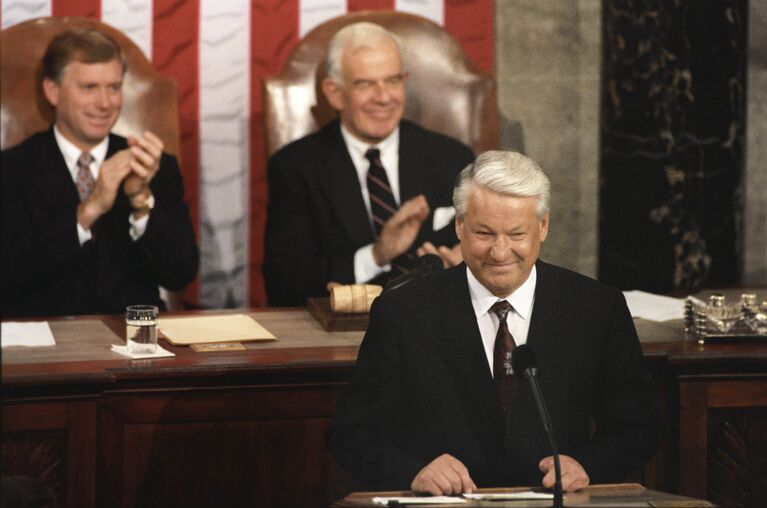 In the post-Soviet years, Russia trusted too much those who did not deserve it.
In the post-Soviet years, Russia trusted too much those who did not deserve it.
I will name them directly - those who should not have been trusted. This is the United States, Western Europe, including the largest countries: Britain, France, Germany, Italy.
The country succumbed to the hypocritical tricks of historical opponents, not understanding that their signatures on documents are pure fiction, and their words are often not worth a penny (c) Medvedev[
This has never happened before and here it is again.
They began to deceive themselves during Perestroika, and they continued until recently.
https://colonelcassad.livejournal.com/9809326.html
Google Translator

